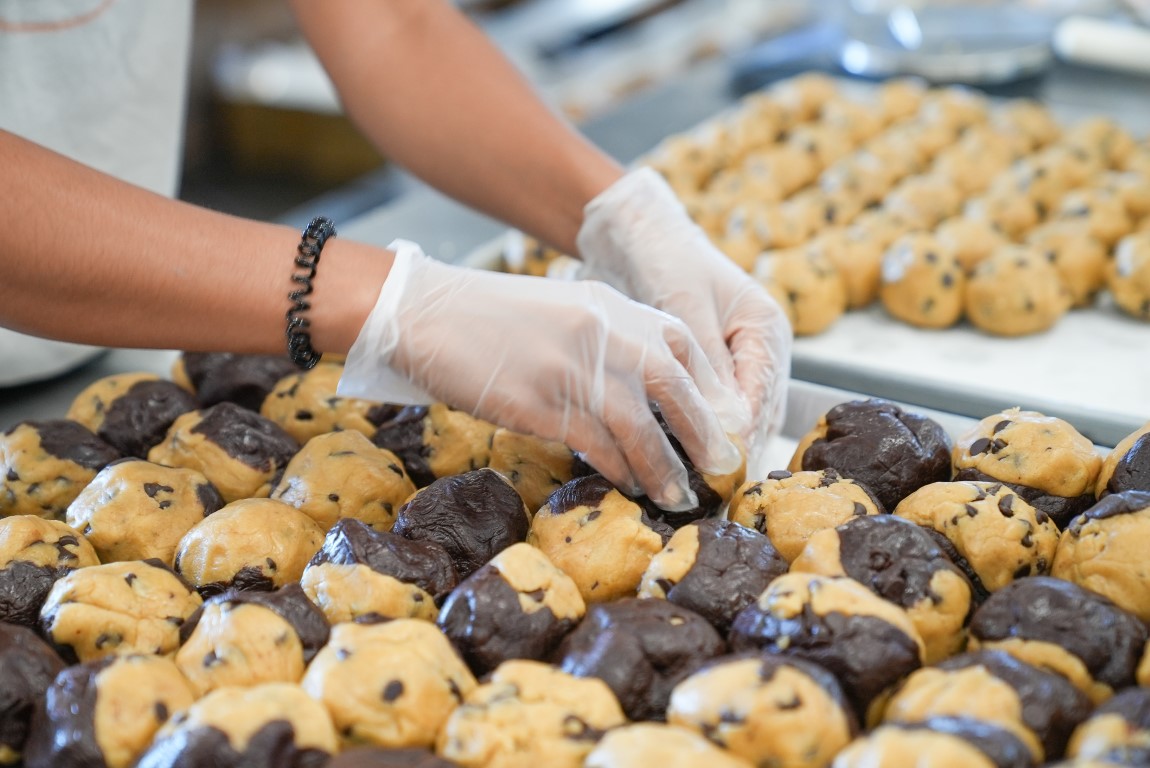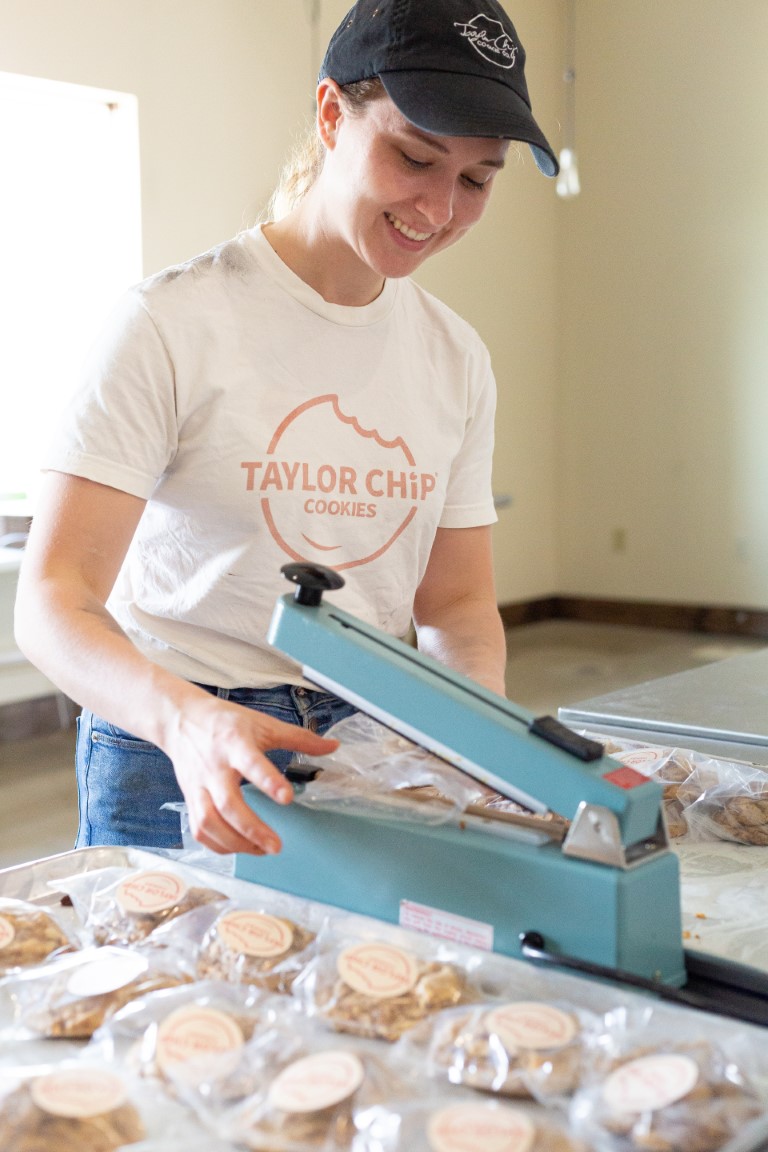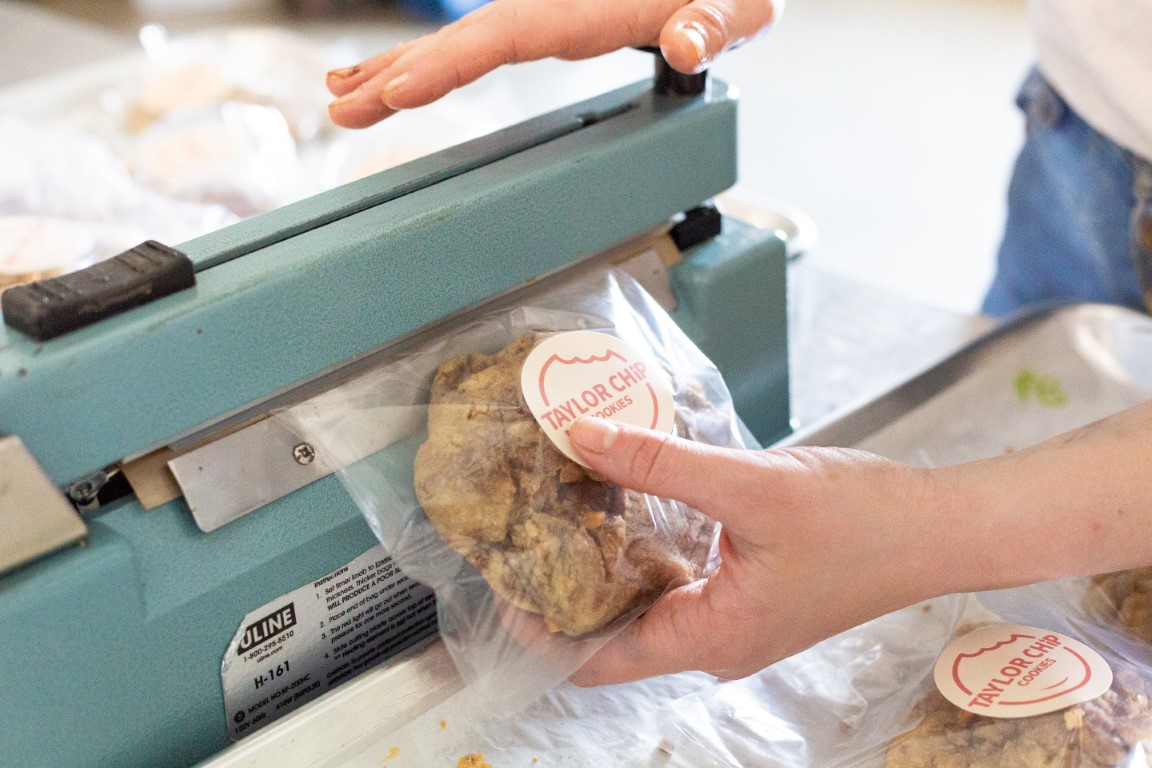Ever wonder how long can baked cookies last? Well, Baked cookies can last from a few days to several weeks, influenced by their moisture content, ingredients, and storage methods. Moist cookies like chocolate chip may stay fresh for about a week, while drier cookies like shortbread can last up to two weeks in airtight containers. Proper storage greatly impacts freshness; using airtight containers and keeping cookies in cool, dry places can prolong their life. Freezing cookies can further extend their shelf life, preserving both flavor and texture. Understanding these factors can help you optimize the storage of your baked goods to enjoy them longer. For an in-depth view, keep exploring.
Key Takeaways
- Cookies stored in airtight containers in a cool, dry place can last up to two weeks.
- Freezing cookies or cookie dough extends their shelf life significantly, preserving quality for months.
- Homemade cookies typically stay fresh for 3-5 days in airtight containers.
- Specialty cookies like macarons lose quality after a few days, unlike traditional cookies.
- Store-bought cookies often have longer shelf lives due to preservatives.
Importance of Cookie Shelf Life
Understanding cookie shelf life is essential because it directly impacts consumer demand and helps reduce food waste. You want your cookies to stay fresh for as long as possible, satisfying customers who expect quality and longevity. Additionally, longer shelf life means fewer cookies end up in the trash, which is better for both the environment and your budget.
Consumer Demand and Food Waste Reduction
Why does cookie shelf life matter so much? It's essential for both consumer demand and food waste reduction. When you bake cookies, you want them to last as long as possible without turning stale. Proper shelf life management guarantees that baked cookies stay fresh, which directly impacts their appeal. Using an airtight container for storage helps retain moisture and prevents the cookies from becoming dry and unappetizing.
The ingredients you use also play a noteworthy role. Perishable ingredients, if not stored correctly, can lead to faster spoilage. This is why understanding moisture loss and using appropriate cookie storage containers is key to maintaining quality. For long-term storage, it's important to take these factors into account to make sure your cookies stay enjoyable for a longer period.
Consumer demand drives the need for longer shelf life. People want to buy or make cookies that stay fresh, which reduces the frequency of baking and purchasing. This not only satisfies their cravings but also helps in food waste reduction. When cookies last longer, you're less likely to throw them away, contributing to a more sustainable and efficient food consumption cycle.

Choose Your Own Delightfully Perfect Cookies.
With almost 30 flavors to choose from, you can make your box as unique as you are.
Factors Influencing Cookie Shelf Life
When considering how long your baked cookies will last, you need to think about several key factors. Moisture content and the ingredients you choose play a huge role in determining their freshness, while the baking conditions and use of sugar alternatives can also impact shelf life. Additionally, the type of packaging materials and the storage conditions you use are essential to maintaining their quality.
Moisture Content and Ingredient Selection
You might be surprised to learn that the moisture content and ingredients you choose play an essential role in determining how long your baked cookies stay fresh. Moist cookies, such as those with higher moisture content, tend to have a shorter shelf life compared to dry cookies. Chewy cookies, which often include ingredients like brown sugar and butter, retain more moisture, making them more prone to becoming stale quickly. In contrast, crisp cookies, which have less moisture, generally last longer.
Your ingredient selection also greatly affects the longevity of your cookies. For instance, butter-based cookies tend to stay fresher longer than those made with margarine due to butter's natural fats. Sugar cookies, typically made with granulated sugar, can also last longer if stored correctly. Different cookie types, like oatmeal or chocolate chip, have varying shelf lives based on their ingredients and moisture content.
To maximize freshness, always store your cookies in an airtight container. This helps maintain their desired texture, whether you prefer them chewy or crisp. The moisture content and ingredients you use are vital factors in ensuring your baked cookies remain delicious for as long as possible.
Baking Conditions and Sugar Alternatives
In addition to moisture content and ingredient selection, the baking conditions and sugar alternatives you use can greatly influence how long your cookies stay fresh. First, consider the baking conditions. Overbaking or baking at too high of a temperature can dry out your baked cookies, reducing their shelf life. Use a cookie sheet that facilitates even baking, and avoid overcrowding it with cookie dough to guarantee uniform heat distribution. This helps maintain the texture and moisture needed for longer-lasting homemade cookies.
Next, let's talk about sugar alternatives. Using alternatives like honey, molasses, or artificial sweeteners can impact the shelf life of your cookies. These substitutes often attract more moisture, which can either help maintain freshness or, conversely, lead to quicker spoilage if not stored properly. Fresh cookies made with sugar alternatives should be placed in air-tight containers to maximize their longevity. Properly sealed storage containers prevent exposure to air and moisture, critical factors in extending shelf life.
Packaging Materials and Storage Conditions
Effective packaging materials and ideal storage conditions are vital for extending the shelf life of baked cookies. To keep your cookies fresh, start by choosing appropriate packaging materials. Zip-top bags and resealable plastic bags are convenient and help maintain moisture levels. For an eco-friendly option, consider using parchment paper to wrap individual cookies before placing them in a cookie jar or airtight container. This prevents them from sticking together and preserves their texture.
Storage conditions also play an important role. Keep your baked cookies in a cool, dry place away from direct sunlight, as heat and light can cause them to spoil faster. An airtight container is particularly effective in shielding cookies from moisture and air, which can lead to staleness. If you need to store cookies for an extended period, placing them in the freezer is a viable option. Frozen cookies can last for weeks or even months without losing their quality.
Types of Cookies and Their Shelf Lives
When considering how long your baked cookies will last, it's important to acknowledge the differences between traditional and specialty cookies, as these factors can greatly influence their shelf lives. Flavor pairings also play a role, with certain ingredients requiring specific storage methods to maintain freshness. By understanding these aspects, you can better guarantee your cookies remain delicious for as long as possible.
Traditional vs. Specialty Cookies
Although traditional and specialty cookies share some common ingredients, their shelf lives can vary greatly based on their unique components and preparation methods. Traditional cookies, such as chocolate chip or oatmeal raisin, typically have a longer shelf life due to their simpler ingredients and straightforward baking processes. Specialty cookies, like macarons or biscotti, often include unique ingredients or elaborate preparations that can impact their durability.
To guarantee your baked cookies remain fresh, consider these factors:
- Types of cookies: Traditional cookies usually last longer than specialty ones.
- Storage conditions: Keeping cookies in an airtight container can greatly extend their shelf life.
- Air exposure: Minimize air exposure to maintain cookie freshness.
- Cookie recipes: Ingredients and preparation methods directly affect how long cookies stay fresh.
Traditional cookies can often stay fresh for up to two weeks when stored properly in a sealed container. Specialty cookies, however, may only last a few days before they lose their ideal texture and flavor. Always consider the specific type of cookie and its ingredients when determining the best storage practices to maximize shelf life. By understanding these differences, you can better manage your cookie recipes and storage to enjoy them at their best.
Flavor Pairing and Storage Methods
Understanding flavor pairing and storage methods is essential for getting the most out of your cookies. When you want to keep cookies fresh, it's important to take into account the type of cookie and the best storage method. For instance, homemade sugar cookies should be stored in a container of cookies with wax paper between them to prevent sticking. When storing different baked holiday cookies, keep cookies separate to avoid flavor mixing.
Layering your cookies in layers can help maintain their structure and prevent them from becoming cookies limp. For cookies for refrigeration like soft, chewy varieties, use airtight containers. If you plan on storing cookies in the freezer, wrap them individually to maintain their flavor and texture. Cookies in freezer conditions can last several months, but be sure to defrost them slowly to avoid condensation.
Always store cookies away from strong-smelling foods to prevent odor absorption. To keep cookies fresh longer, avoid exposure to air and moisture. Use wax paper to separate layers, and think about refrigerating or freezing for extended shelf life. By understanding these methods, you'll enjoy the best texture and flavor from your baked treats.
Evaluating Cookie Shelf Life
To evaluate the shelf life of baked cookies, you need to take into account both microbial stability and sensory evaluation. Factors like moisture content and ingredient types play an important role in determining how long cookies remain safe and enjoyable to eat. Additionally, consumer preferences often differ between homemade and store-bought cookies, impacting perceptions of freshness and quality.
Microbial Stability and Sensory Evaluation
When it comes to extending the shelf life of baked cookies, microbial stability and sensory evaluation are essential factors. To guarantee your cookies last longer while maintaining their quality, you'll need to take into account several aspects.
Microbial stability is influenced by the moisture content in cookie doughs. High moisture levels can encourage microbial growth, reducing the shelf life of baked cookies. To mitigate this, you should store your cookies in airtight containers, such as cookie tins, which help control moisture and prevent contamination.
Sensory evaluation focuses on how storage conditions affect the taste, texture, and aroma of your cookies. Over time, cookies may become stale, losing their appeal. To keep them fresh, it's critical to monitor their environment.
Here are some tips to enhance the shelf life of your baked cookies:
- Use airtight containers: Store cookies in containers with tight seals to maintain moisture content and prevent exposure to air.
- Control storage temperature: Keep cookies in a cool, dry place to minimize microbial growth.
- Separate flavors: Store different types of cookies separately to preserve their distinct flavors.
- Monitor for signs of staleness: Regularly check your cookies for changes in texture or smell.
Consumer Preferences: Homemade vs. Store-Bought
Many wonder whether homemade or store-bought cookies have a longer shelf life. When comparing these options, you'll find that store-bought cookies generally have a longer shelf life due to preservatives. However, homemade cookies offer a different appeal.
Using homemade cookie dough, you can control the ingredients, which often results in cookies that taste fresher. Homemade cookies, especially baked drop cookies, usually stay fresh for about 3-5 days when stored in an airtight container. To keep cookies moist, you might want to add a slice of bread to the container with cookies.
Store-bought cookies, on the other hand, can last several weeks, thanks to added preservatives. They come in various types of cookie dough that cater to different tastes, but the downside is the potential for a less fresh taste.
For the best results, consider storing different types of cookies in separate containers to prevent flavor mixing. Ultimately, while store-bought cookies may win in shelf life, homemade cookies often triumph in taste and freshness, offering you the chance to enjoy a more personalized and satisfying cookie experience.
Innovations for Extended Shelf Life
To extend the shelf life of baked cookies, you can explore using unique ingredients and nutritional enhancements. By carefully balancing nutrition, taste, and longevity, you guarantee your cookies remain delicious and fresh for longer periods. Innovations like natural preservatives and alternative sweeteners can play an essential role in achieving this balance.
Unique Ingredients and Nutritional Enhancements
Innovative ingredients can considerably extend the shelf life of baked cookies, guaranteeing they stay fresh and delicious for longer. By incorporating unique ingredients and nutritional enhancements, you can achieve a balance between maintaining the cookies' texture and boosting their longevity. For instance, adding natural preservatives like honey or maple syrup can help keep cookies soft while extending their shelf life. Also, using whole grain flours and adding nuts or seeds can enhance the nutritional profile without compromising taste.
To help you get started, consider these ideas:
- Honey or Maple Syrup: Natural sweeteners that also act as preservatives.
- Whole Grain Flours: Boost nutritional value and maintain texture.
- Nuts and Seeds: Add healthy fats and nutrients, increasing shelf life.
- Piece of Bread: Store with a piece of bread in the container to keep cookies soft.
Different storage methods can also impact how long your cookies remain fresh. For example, placing a piece of bread in the container with your baked cookies can help them stay soft over an extended period. Understanding the unique characteristics of various cookie types can guide you in selecting the best nutritional enhancements and storage techniques. Whether you prefer cookies crisp or soft, these innovations guarantee your treats stay enjoyable longer.
Balancing Nutrition, Taste, and Longevity
Balancing nutrition, taste, and longevity in baked cookies involves a fine blend of thoughtful ingredient selection and smart storage techniques. When aiming to extend the shelf life of your delicious treats, consider the type of ingredients you use. Healthier options like whole grains and natural sweeteners can sometimes lead to a shorter shelf life, but proper storage can mitigate this.
Storing your cookies in an airtight container with cookies can greatly extend their freshness. For softer cookies, adding a slice of bread to the container helps maintain moisture for a longer period of time. Alternatively, freezing the dough in advance can preserve its quality, allowing you to bake perfect cookies whenever you need them.
Holiday baking often involves making cookies in large batches, so these methods are particularly useful. Participating in cookie swaps also benefits from these techniques, ensuring your contributions remain fresh and tasty. To strike the right balance, experiment with various recipes and storage methods until you find the ideal combination that suits your needs. By paying attention to both ingredients and storage, you can enjoy delicious cookies that remain fresh and nutritious over an extended period.
Future Considerations
Looking ahead, you'll want to keep an eye on emerging research areas and preservation techniques that could revolutionize how long baked cookies last. Scientists are exploring new methods to enhance shelf life without compromising taste or texture, aligning with growing consumer trends for natural and additive-free products. By embracing these advancements, you can meet evolving market demands while ensuring your cookies stay fresh much longer.
Research Areas and Preservation Techniques
Exploring new research areas and preservation techniques can greatly extend the shelf life of baked cookies. By focusing on innovative methods, you can guarantee your cookies stay fresh and delicious for longer periods. One key aspect is the use of proper storage tips.
- Utilizing parchment paper can prevent cookies from sticking together and maintain their texture.
- Storing cookies in airtight containers helps preserve their moisture and flavor.
- Freezing cookie dough before baking can enhance cookie longevity, allowing you to bake fresh cookies on demand.
- Differentiating between unfrosted cookies and frosted cookies in storage can maintain the quality of both types, as frosted cookies often require different conditions due to their icing.
When considering preservation techniques, it's essential to focus on maintaining the ideal environment for your baked cookies. This includes controlling temperature, humidity, and exposure to air. Using airtight containers and parchment paper can markedly extend shelf life by preventing moisture loss and contamination. Additionally, frozen cookie dough offers a practical way to bake cookies as needed, guaranteeing they are always fresh. By implementing these strategies, you can enjoy your baked treats longer while maintaining their delicious taste and texture.
Meeting Consumer Trends While Extending Shelf Life
Consumers' preferences and expectations are continually evolving, especially when it comes to baked goods. Meeting these trends while extending the life of cookies requires innovative approaches. First, consider how cookies in containers will help maintain freshness. Airtight containers prevent cookies in air from becoming stale, guaranteeing a longer shelf life.
When preparing a batch of cookies, you might want to think about baked icebox cookies or classic chocolate chip cookies. These varieties can benefit from proper storage techniques to remain fresh. Freezing frozen cookie dough balls before baking is another strategy, allowing you to enjoy fresh cookies after baking without compromising quality.
For those who love giving cookies to gift, making sure they stay fresh is essential. Proper packaging can prevent cookies from becoming soggy, preserving their texture and flavor. Additionally, advances in packaging materials can play a notable role in extending the life of cookies.
Understanding consumer trends and preferences helps you make informed decisions. Whether you're storing cookies for personal consumption or gifting, these strategies guarantee your cookies remain delicious and fresh longer. Adjusting to these trends is key to satisfying modern consumers while extending the shelf life of your baked goods.
Why Trust Our Cookie Craftsmanship?
At Taylor Chip, our journey into the world of cookies began as a labor of love. Since 2015, Sara and Dougie Taylor have been perfecting the art of cookie baking, transforming their passion into expertise. What started as a fun date night activity quickly evolved into a relentless pursuit of the perfect cookie, culminating in a mastery of baking techniques and flavor combinations.
Our dedication to crafting the ideal cookie extends far beyond just taste. We've spent years experimenting with various ingredients, baking conditions, and storage methods to ensure our cookies not only taste amazing but also maintain their quality for as long as possible. This hands-on experience has given us unique insights into the factors that influence cookie shelf life, from moisture content and ingredient selection to packaging materials and storage conditions. Our commitment to excellence means we're constantly innovating and refining our methods to bring you the best possible cookie experience.
By choosing Taylor Chip, you're not just getting a cookie – you're benefiting from years of dedicated research and development in cookie craftsmanship. Our expertise allows us to offer you not only delicious treats but also valuable knowledge on how to keep your cookies fresh and enjoyable for longer periods. Whether you're a casual cookie lover or a baking enthusiast, our insights can help you make the most of your baked goods, ensuring every bite is as delightful as the first.
Frequently Asked Questions
Can Baked Cookies Be Frozen to Extend Their Shelf Life?
Yes, you can freeze baked cookies to extend their shelf life. Just place them in an airtight container or freezer bag. When you're ready to enjoy, let them thaw at room temperature for the best texture.
What Are the Best Storage Containers for Baked Cookies?
You should use airtight containers to keep your baked cookies fresh. Plastic or glass containers with tight-fitting lids work best. Make sure they're completely cooled before storing to prevent moisture buildup and maintain their texture.
How Does Altitude Affect the Shelf Life of Baked Cookies?
At higher altitudes, baked cookies can dry out faster due to lower humidity and air pressure. You'll need to store them in airtight containers to keep them fresh and maintain their texture for a longer period.
Are There Natural Preservatives That Can Extend Cookie Shelf Life?
Yes, you can use natural preservatives like honey, which has antimicrobial properties, or cinnamon, which acts as an antioxidant. These ingredients can help extend your cookies' shelf life while keeping them delicious and chemical-free.
How Can I Tell if My Baked Cookies Have Gone Bad?
You can tell if your baked cookies have gone bad by checking for any odd smells, changes in texture, or visible mold. If they taste stale or off, it's best to toss them out.
Conclusion
In summary, understanding the factors that affect cookie shelf life is vital for maintaining their quality. By considering the type of cookie, storage conditions, and evaluating shelf life accurately, you can guarantee your baked goods remain fresh for as long as possible. Advances in packaging and preservation techniques offer promising solutions for extending shelf life, and staying informed about these innovations can help you maximize the longevity of your cookies in the future.










